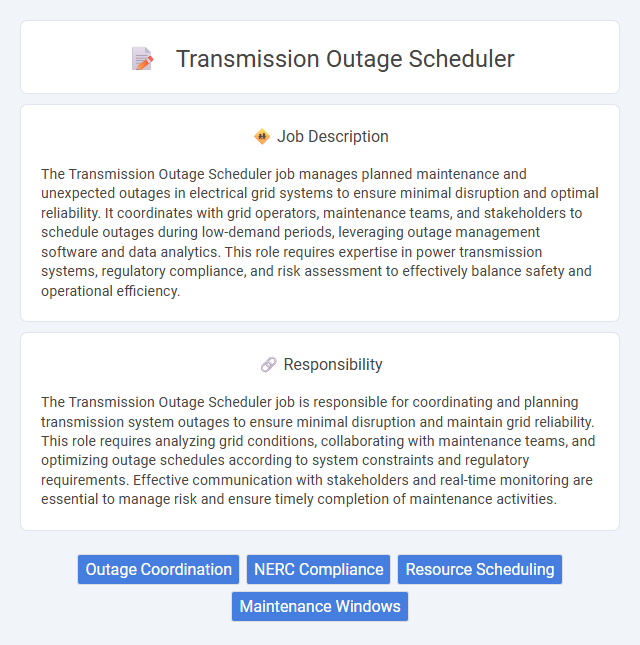
The Transmission Outage Scheduler job manages planned maintenance and unexpected outages in electrical grid systems to ensure minimal disruption and optimal reliability. It coordinates with grid operators, maintenance teams, and stakeholders to schedule outages during low-demand periods, leveraging outage management software and data analytics. This role requires expertise in power transmission systems, regulatory compliance, and risk assessment to effectively balance safety and operational efficiency.
Individuals with strong analytical skills and attention to detail are likely to be well-suited for a Transmission Outage Scheduler position, as the role involves coordinating complex schedules and managing multiple variables under pressure. Candidates who demonstrate effective communication and problem-solving abilities may have a higher probability of success, given the need to collaborate with various teams and respond promptly to unplanned outages. Those who handle stress poorly or struggle with organization might find this job challenging and less suitable for their capabilities.
Qualification
The Transmission Outage Scheduler job requires expertise in power system operations, detailed knowledge of transmission planning, and proficiency in outage coordination tools such as SAP and outage management systems. Candidates should possess strong analytical skills and experience with NERC reliability standards and transmission system constraints. A degree in electrical engineering or a related field combined with relevant certifications enhances qualification for effective outage scheduling and risk mitigation.
Responsibility
The Transmission Outage Scheduler job is responsible for coordinating and planning transmission system outages to ensure minimal disruption and maintain grid reliability. This role requires analyzing grid conditions, collaborating with maintenance teams, and optimizing outage schedules according to system constraints and regulatory requirements. Effective communication with stakeholders and real-time monitoring are essential to manage risk and ensure timely completion of maintenance activities.
Benefit
A Transmission Outage Scheduler job likely improves coordination and efficiency by systematically planning maintenance windows, reducing unexpected downtime. It probably enhances grid reliability through optimized timing of outages, minimizing disruption to power supply. This role may also support compliance with regulatory requirements by ensuring transparent and documented scheduling processes.
Challenge
The Transmission Outage Scheduler job likely involves managing complex coordination between multiple teams to minimize the risk of service disruption. It probably requires forecasting potential conflicts and resource constraints to ensure maintenance windows are optimized effectively. The challenge may stem from balancing urgent repairs with minimizing operational impact, demanding precise communication and contingency planning.
Career Advancement
A Transmission Outage Scheduler job offers significant career advancement opportunities within the energy and utilities sector. Professionals gain expertise in coordinating and managing power grid outages, enhancing skills in project management, regulatory compliance, and risk assessment. Mastery in this role paves the way for leadership positions such as Transmission Planner, Operations Manager, or Energy Systems Analyst.
Key Terms
Outage Coordination
Transmission outage scheduler jobs ensure precise alignment of maintenance activities with grid reliability standards, minimizing system downtime and preventing service disruptions. Effective outage coordination integrates multi-stakeholder communication, advanced scheduling tools, and real-time grid impact analysis to optimize outage windows. Leveraging predictive analytics and regulatory compliance frameworks enhances decision-making accuracy and supports seamless transmission network operations.
NERC Compliance
The Transmission Outage Scheduler job is critical for ensuring compliance with North American Electric Reliability Corporation (NERC) standards, particularly FAC-008 and TOP-004 requirements. This role involves careful planning and coordination of transmission outages to maintain system reliability and avoid violations of NERC's mandatory outage scheduling protocols. Effective scheduling reduces risks of cascading outages and supports real-time grid stability as mandated by NERC reliability guidelines.
Resource Scheduling
The Transmission Outage Scheduler job optimizes resource scheduling by allocating personnel, equipment, and time slots to minimize downtime and ensure safe maintenance operations. It integrates real-time grid data and outage requests to coordinate resource deployment efficiently, reducing conflicts and delays. Advanced algorithms prioritize critical transmission lines and balance workload distribution for maximum operational reliability.
Maintenance Windows
The Transmission Outage Scheduler job manages and coordinates maintenance windows to ensure minimal disruption to network services during planned outages. It optimizes scheduling by aligning maintenance activities with low-traffic periods, reducing impact on transmission reliability. This process utilizes real-time data and predictive analytics to adjust maintenance windows dynamically and maintain system stability.
 kuljobs.com
kuljobs.com